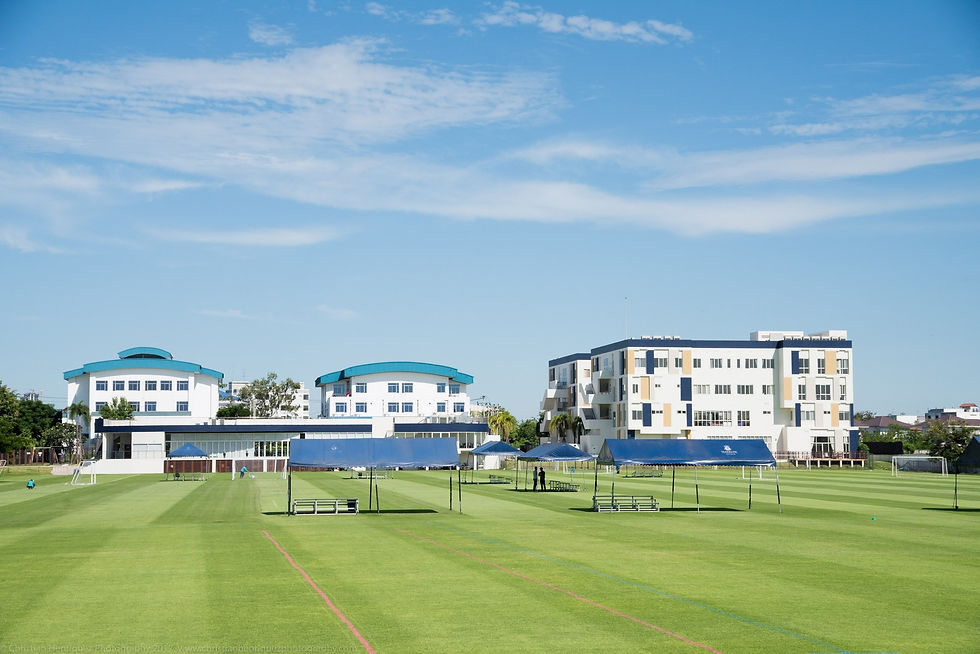Key Insights into International Schools in Thailand
- Vandana Chugani
- Jul 19, 2025
- 4 min read
Updated: Jul 20, 2025
Thailand is known for its rich culture, vibrant lifestyle, and scenic landscapes. For expat families and local residents, one crucial aspect of living in Thailand is education. International schools have become increasingly popular, offering diverse curricula, state-of-the-art facilities, and a multicultural environment. This post aims to provide key insights into the international schools in Thailand, helping parents make informed decisions.
Understanding Thailand International Schools
International schools in Thailand cater to students from various backgrounds, providing a global perspective on education. They offer different curricula, including the British, American, and International Baccalaureate programs. This diversity allows parents to choose a school that aligns with their educational philosophies and their children's needs.
Statistics Show Growth
The growth of international schools in Thailand has been remarkable. According to the Office of the Private Education Commission, there were over 200 international schools in Thailand by 2021, accommodating approximately 200,000 students. This number continues to rise as more families relocate to Thailand, whether for work or lifestyle changes.

When considering the best educational environment, parents often focus on several factors, including the school's accreditation, faculty qualifications, and student-to-teacher ratio. Many international schools operate under stringent accreditation standards, which ensures a level of quality in teaching and learning.
The supportive and inclusive culture found in these schools is also a major draw for families. With students of various nationalities, children learn the value of diversity and are better prepared for a globalized world.
Features of International Schools in Thailand
Thailand's international schools are known for their impressive features and facilities. Here are some highlights:
Curriculum Variety: As mentioned earlier, schools provide multiple curricula, allowing students to learn in a way that suits their individual learning styles. For example, the International Baccalaureate is known for its rigorous academic standards and focus on critical thinking.
Extracurricular Activities: Many schools emphasize a holistic education, incorporating extracurricular activities such as sports, arts, and leadership programs. This helps develop teamwork, creativity, and leadership skills outside of traditional classroom learning.
Facilities: High-quality facilities, including science labs, libraries, and sports complexes, are common in international schools. These resources enable students to explore their interests and talents fully.
Language Programs: Many schools also offer language programs that support both native and non-native English speakers, bridging gaps in language learning and promoting multilingualism.

What are the best international schools in Thailand?
When it comes to determining the best international schools in Thailand, several factors come into play. Here are a few schools frequently recognized for their excellence:
Bangkok Prep: This British curriculum school focuses on a well-rounded education. It offers small class sizes and a diverse range of extracurricular activities, creating a nurturing environment for students.
International School Bangkok (ISB): With a reputation for academic excellence, ISB offers the American curriculum alongside advanced placement courses. It is well-known for its robust college counseling program.
NIST International School: NIST offers the International Baccalaureate (IB) program, focusing on inquiry-based learning. With a diverse student body, NIST promotes an inclusive atmosphere that values unique cultural perspectives.
Harrow International School: Known for its British heritage, Harrow combines traditional education values with modern teaching strategies. Its stunning campus and emphasis on leadership make it a standout choice.
Ruamrudee International School: With a comprehensive American curriculum, this school is appreciated for its supportive community and strong emphasis on student well-being.
Choosing the right school involves more than just rankings; parents should consider each school's philosophy, community involvement, and how well it aligns with their children's needs.
Choosing the Right International School
When selecting an international school for your child in Thailand, several factors should be taken into account:
Location: Proximity to home can greatly affect daily commutes. Consider schools near residential areas to simplify logistics.
Curriculum: Understand the curriculum offered and consider your child's strengths and future academic goals. For instance, if a child plans to attend a university abroad, an IB or British curriculum may be beneficial.
Visit Schools: If possible, schedule visits to prospective schools. Take the time to tour the facilities and meet teachers. This firsthand experience can be invaluable in understanding the school's culture.
Ask Questions: During the visits, ask questions regarding class sizes, teaching styles, and support services available for students. This will help you gauge whether the school meets your expectations.

The Impact of Local Culture and Environment
Living in Thailand offers a unique opportunity for students to immerse themselves in a rich cultural experience. International schools often incorporate Thai culture into their curriculum, fostering a deeper understanding of local customs and traditions. Schools may celebrate Thai festivals, organize field trips to historical sites, or teach the Thai language alongside other subjects.
Additionally, the international community within these schools often benefits from the warm hospitality typical of Thai culture. Students learn not just academic subjects but also life skills and values, including respect for diversity and an appreciation for different cultural perspectives.
Preparing for the Future
International schools in Thailand provide students with an education that prepares them for an increasingly globalized world. Students learn vital skills, such as critical thinking, collaboration, and adaptability, which are essential in today’s fast-paced society.
Moreover, the international exposure helps cultivate a sense of global citizenship. Graduates from these schools often have the opportunity to attend prestigious universities around the world, thanks to their comprehensive learning experiences and language skills.
In summary, choosing an international school in Thailand can greatly benefit expat families and local residents alike. By understanding the features, programs, and cultural offerings of various schools, parents can make well-informed decisions that will support their children's growth and development.
Final Thoughts
As you navigate through various options, remember that the ideal school for your child encompasses much more than just academic performance. It should foster a sense of belonging, encourage creativity, and support overall well-being. Additionally, explore resources and reviews of international schools in Thailand to see what aligns best with your family’s goals.



Comments